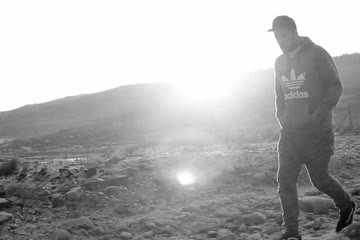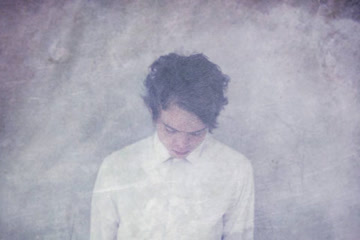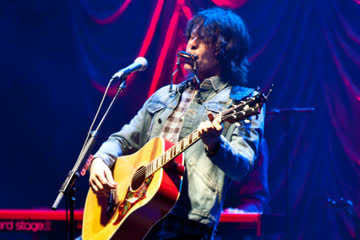OPINION: We Love Triple J, But It Needs To Be Punk Again
Triple J has gotten kind of middle-aged, and it’s in a very different media landscape from the one it launched in. It needs to find its edge again.

triple j (Source: Supplied)
This article began as a video on my band’s TikTok. One day, I got a bit fed up with the usual social media strategies, and I started talking to the camera about politics, Australia, art, and the music scene—the things our band is about and involved in.
At first, I focused on the slightly less discussed aspect of the music industry. I started out talking about media deregulation. Weirdly, our stuff went viral-ish—at least viral for a band that had twelve hundred followers and averaged a couple of hundred views. Pretty soon, it became clear we were going to need to address some of the elephants in the room in the Australian music industry, and there is no elephant larger in Australia than triple j.
So, I made a video about triple j. We called it a love letter to triple j, and we meant it. But loving someone doesn’t mean you only say the nice, easy things. Loving someone means telling the truth.
But first, I’m Mark. I’m in a band called Strawberry Swing. And we have opinions. Let’s boogie.
@strawberryswingband This is a love letter to @triple j ❤️ We’ve been talking about #ausmusic and #radio but we can’t talk about #australianmusic without talking about #triplej so let’s talk about the home of #likeaversion and the #hottest100 #australia #music #newmusic #australianartist #australianartists
♬ original sound - Strawberry Swing
Don't miss a beat with our FREE daily newsletter
So, let’s talk about triple j. Triple j is a publicly owned, government-funded radio station that’s become Australia’s national youth broadcaster. It was founded in the 1970s with the explicitly mandated goal of making radio for 18–24-year-olds. And when triple j started, it was PUNK AS F*CK.
It was launched in 1975 by the Whitlam government. Originally, it was just broadcast in Sydney and was called 2JJ. When they launched, the first song they ever played was You Just Like Me Cos I’m Good In Bed by the Skyhooks.
This was significant for two reasons: it was an Australian song when commercial radio wasn’t playing much Australian music, and it was banned on nearly every other radio station in the country. Playing that song first up was a statement: triple j was PUNK AS F*CK.
And 2JJ, as it was then called, had an immediate effect on the charts. If you go back and look at the Australian music charts, you can see exactly when triple j was founded. That album by the Skyhooks ended up becoming the highest-selling album in Australia by an Australian artist up to that point: an album that was banned by nearly every other radio station.
So, out of the gate, 2JJ (or triple j) established two key aspects of its identity: it supported Australian music and didn’t give two s**ts what the old people were doing. And that punk attitude stuck around.
In 1990, triple j had been playing NWA’s song, F**k Tha Police, and no one had really noticed. Then, an ABC bigwig did notice and immediately banned the song from the station. In response, the staff at triple j protested, and for the next 24 hours, they broadcast NWA’s Express Yourself on repeat for 24 hours. It played 82 times. To this day, there is still an NWA sample in the triple j news theme.
From the beginning, triple j sponsored live music events and had a real commitment to the Australian live scene. There are so, so, so many artists we would never have heard of in Australia were it not for triple j’s support. Triple j was and remains a hugely important part of the Australian music scene, and anyone who tries to tell you otherwise is full of s**t.
But, for as long as triple j has been a thing, there’s been people bitching about it, and that’s what I really want to talk about.
I don’t want to worry too much about historic complaints about triple j. I think they’re mostly, “triple j plays naughty music” and yeah, it’s for 18-24-year-olds. That’s what it should be doing. There were also some issues in the past with the representation of women and the general diversity of its staff. Although, I think the gender issue actually got worse after it was founded. But a lot of that stuff has been addressed more recently. It’s probably not perfect, but it’s not the white boy club it was accused of being 10-15 years ago.
Let’s focus on the here and now.
I think there are two main headings under which you could criticise triple j. There’s a third one as well, which is that triple j is ‘woke’. That’s mostly just culture war nonsense, and I’m happy to address that elsewhere (and have already done so on TikTok). But if you think triple j being ‘woke’ is new, I don’t think you’ve ever really been paying attention.
@strawberryswingband Replying to @theopinionindustry triple j has always been “woke”. #triplej #ausmusic #woke #culturewars #australia #australianmusic #radio
♬ original sound - Strawberry Swing
For now, though, the two main criticisms are that triple j sounds too much like Top 40 at the moment and that there’s a “triple j sound.” Let’s get into those.
First up, the “triple j sound”. The first time I remember seeing that argument was around 2014. There was an article in the Sydney Morning Herald called Calling the Tune, and they interviewed a bunch of artists anonymously about the fact that they felt they had to conform to the “triple j Sound” to get airplay.
The article argued this was having a homogenising effect on the Australian music industry. What I find interesting about this isn’t the article itself but when it came out. It came out in 2014, roughly seven years after John Howard’s massive media reform or, more accurately, the deregulation of Aussie media.
If you want to know more about this, I discussed it in an earlier TikTok, but basically, by 2014, only two companies owned most of Australia’s radio.
Newspapers and TV are about the same. Thanks to similar laws in the US, ditto record labels. In fact, Australia has one of the most concentrated media ownership landscapes in the world. Something else Howard also did was weaken local content laws that used to force commercial radio to play local music.
@strawberryswingband #stitch @Nic Kelly why is Aussie Music not charting? This is a pretty broad overview of some stuff. There’s lots more detail and definitely other factors involved as well. And there are always exceptions, but we think this is a pretty good place to start a convo. #ausmusic #radio #aria #indiemusic #strawberryswing #australia #top40
♬ original sound - Strawberry Swing
Why does this matter? Because I think there’s probably always been a “triple j Sound”. It’s one radio station; it’s going to go through trends, and yes, it’s going to be subject to favouritism by the people in charge of choosing what gets to air. But I think the reason why this came up in 2014 and hasn’t gone away since is because that was long enough for Howard’s deregulation to have taken hold.
By 2014, there were very few avenues for Australian acts to break through. In the past, a DJ at a local commercial rock station, for example, could break an act. By 2014, it was basically just triple j. So; these artists were understandably annoyed by the triple j sound. But triple j isn’t really the bad guy here. The problem is the broader industry. Australian music has definitely become homogenous, but I’d argue that it is because of deregulation and corporate monopolies, not triple j.
The Australian music industry lacks diversity in terms of pathways for artists, so yes, they all end up sounding the same, trying to conform to what works for those few pathways left. What I do think is a problem with triple j is that they need to do a better job of recognising that they are one of the few places left for Australian music. I think too often, people who work for triple j get defensive on this point and don’t recognise the enormous power they have over artists’ careers.
Most importantly, if we care about the local music industry and want it to flourish, we need to fight some of these broader, structural issues and not just whine about one radio station.
That brings me to the other complaint about triple j: recently, it’s started sounding an awful lot like a commercial, Top 40 radio station. And this one, I think, is probably mostly right.
For context, over the last few years, triple j has been shedding its core audience of 18-24-year-olds. It’s also failed at getting the older cohort of listeners to “age out” of the station.
Intriguingly, 18-24-year-olds don’t appear to be ditching radio altogether, just triple j. I also don’t think it’s a big deal if older people are listening, but I think it needs to maintain that youth audience. Not just because it’s legally required but because there are fewer and fewer cultural spaces aimed solely at the demographic. I won’t get into it here, but a huge problem for young people right now is how the culture being created for them just recycled nostalgia and is not unique to them.
@strawberryswingband Replying to @elhornet thanks everyine who engaged witb our video on @triple j . Here’s some thoughts on why JJJ should retain its youth focus and reclaim its pubk ethos. #triplej #radio #ausmusic #australia #australianmusic #likeaversion #hottest100 #newmusic
♬ original sound - Strawberry Swing
But the main point is that triple j has been losing its core youth audience, and in response to that, they seem to be chasing them by playing more mainstream “youth” popular artists. I think this is a mistake for a bunch of reasons. First up, “chasing” an audience never works; it just reeks of desperation. Crucially, I think it shows management doesn’t understand triple j’s identity or point of difference.
People often complain that triple j presenters have that “triple j voice”. The reason for this is that triple j doesn’t have the budget of the big commercial stations. They can’t afford to hire Hamish & Andy or Kyle & Jackie O (not that I’d want them to). But this means they employ younger, up-and-coming radio presenters, which is absolutely fantastic, but it does mean they will be a bit rougher and rawer than commercial radio. But that’s a strength, not a weakness.
Triple j should lean into that. They used to: they were anarchic and different and edgy in a way that commercial radio can’t be because they can’t afford to piss off advertisers. Unfortunately, at the moment, it feels like triple j is desperate not to piss off ABC's upper management.
As for the music, if triple j does play commercial mainstream music, and I’ve seen a few big names in the Australian music/radio scene saying they should, they lose what makes them different. Then, their only competitive advantage over other stations is that they have no ads. And to be honest, if it’s the same playlist, are most people going to listen to triple j play Top 40 with raw presenters, or will they listen to polished presenters on commercial radio where they might be able to win a car at the same time?
I think we’re already seeing the answer to that question in the ratings.
Ultimately, I think the answer to triple j��s future lies in its past. And I think it lies in the first five minutes of the broadcast. That first song told us that triple j plays Australian music, and it doesn’t give two s**ts what the establishment thinks. That’s where triple j needs to be.
Triple j needs to support Aussie music and be at the vanguard of that, particularly when the Australian music industry is in a bit of crisis and when there aren’t other avenues for local music. And they also need to remember to be PUNK AS F**K. Triple j needs to piss people off again.
They tried that recently with a tweet saying, “Did it hurt when you aged out of triple j?” Or something like that.
did it hurt? when you aged out of the youth radio station
— triple j (@triplej) August 31, 2021
There was a backlash, and they immediately apologised. Now, it was a dumb tweet for a bunch of reasons, especially given people aren’t “aging out” and instead, they’re losing young people. But I liked the idea behind it, and I think they should have doubled down instead of backing down, although ideally with a clever tweet.
Being punk and edgy: that’s triple j’s point of difference. It’s radio that bites. I think they’ve forgotten that.
We love triple j. It’s been and continues to be a massive part of our music scene. But it’s gotten kind of middle-aged, and it’s in a very different media landscape from the one it launched in. It needs to find its edge again. It needs to realise it’s now more important for local artists than ever. And it needs to remember that its strength is precisely that it isn’t commercial radio. If triple j becomes a commercial radio clone, it will die.
We love triple j. It turns 50 next year, and we hope it stays around in some form for another fifty years. But let’s never forget that triple j needs to be punk.







